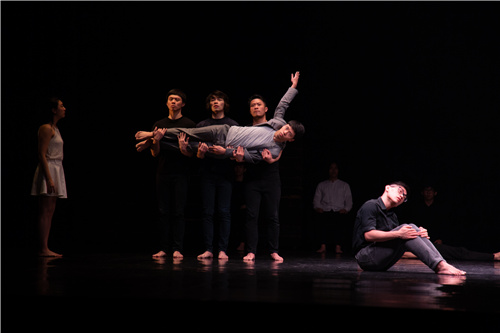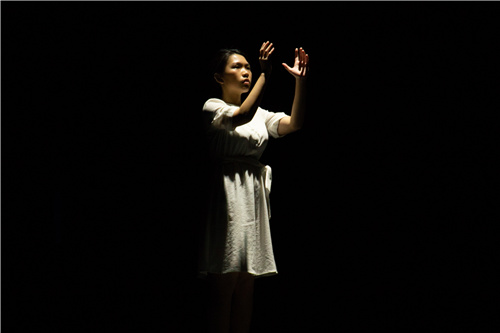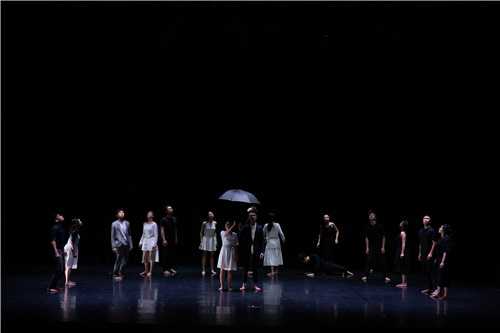
Director: Bonni Chan
Playwright: Samuel Beckett
Institution: The School of Drama, The Hong Kong Academy for Performing Arts
Venue: Chung-Ang University, Korea
Time: 13:30, May 17, 2018
Event: 5th Asian Theatre Schools Festival

Director’s Notes
In "A Piece of Monologue", time moves in a thick fog,
Light infiltrates in stone-like tangible forms.
"...a white gown moving through that gloom"
"...an unutterably faint"
"... rift in dark, which moves to a different dark." "A further darkness."
"So every night. Wake up. Socks. Nightgown."
The spectrum of this "contiguous darkness" is the source of our investigation.
"Words are few. Almost dissipating too," yet how close are they to expressing the inexpressible.
In this room of diffused light, we enter the ever tightening gap between birth and death. Standing stock still, staring out for any possible stirring. In the span of thirty thousand nights or merely thirty-five seconds.

Synopsis
Running Time: approximately 40minutes
-A performance based on the short works of Samuel Beckett, noticeably:" A Piece of Monologue" and "Breathe"
"A Piece of Monologue"(written in English in 1979)
The light fades up on a room, in which a man-identified simply as Speaker-stands motionless facing a blank wall. To his left is a standard lamp the same height as him with a globe about the size of a human skull; it is faintly lit. Just visible to his extreme right is the white foot of a pallet bed. The man is wearing a white nightgown and white bed-socks. After a ten-second pause the actor begins speaking and continues without a break till the end of the play. Speaker "tells a 'story' of a man so much like himself that it is clear he is simply speaking of himself in the third person" who is first seen staring out of a window at the black vast. He has been contemplating the length of his life, which he totals up to "two and a half billion seconds" or "thirty thousand nights." He focuses at first on only two things, being handed around as an infant and the various funerals that have punctuated his time on Earth. Speaker describes the man's efforts to lighting an old-fashioned oil lamp in great detail. He uses up three matches in the process. This appears to be a nightly ritual. The wall that the man stands before used to be covered with pictures" of his once "loved ones". These have been "ripped from the wall and torn-to shreds" and then swept "under the bed with the dust and spiders." The action at an open grave is then narrated "Umbrellas round a grave. Seen from above... Thirty seconds... Then fade." The funeral is taking place in the pouring rain. The man describes watching someone speak at the graveside-presumably the minister-but only "half-hearing what he's saying." The text fragments from this point on. The narrator jumps back and forth from the funeral to the window to the lamp to the wall to his birth. The action does progress somewhat however: in the first mention of the funeral the grave is empty, in the second the coffin is "out of frame" and in the third the coffin is "on its way."
"Breathe"(written in English, premiered in 1969)
"Breathe" is an unusually brief work even among Beckett's short pieces. Its length can be estimated from Beckett's detailed instructions in the script to be about 35 seconds. It consists of the sound of "an instant of recorded vomitus" (a birth-cry), followed by an amplified recording of somebody slowly inhaling and exhaling accompanied by an increase and decrease in the intensity of the light. There is then a second identical cry, and the piece ends. No people are seen on stage, but that it should be "littered with miscellaneous rubbish." Which, however, were specified to be "no verticals", the rubbish was to be "all scattered and lying."

